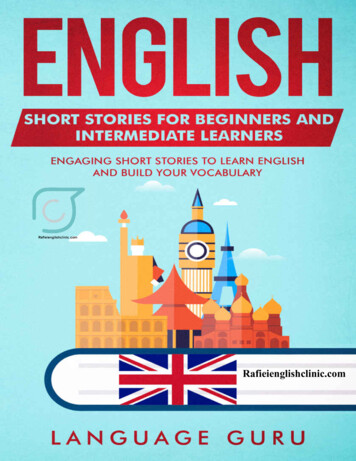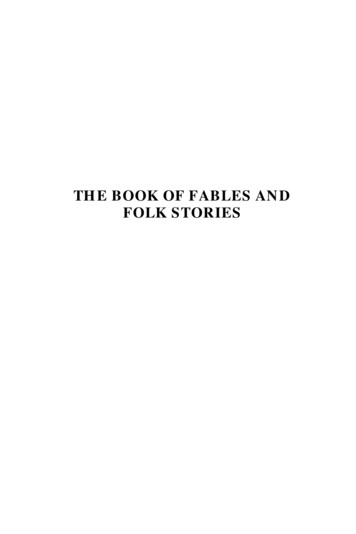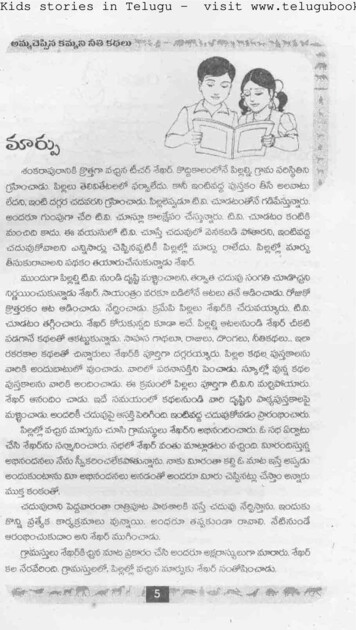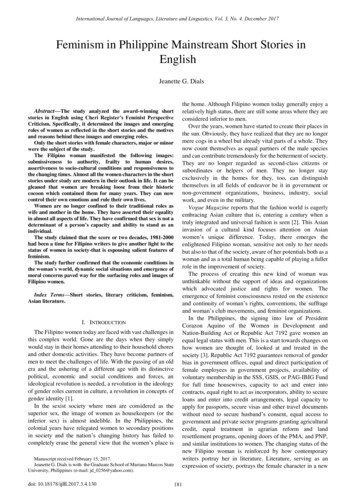
Transcription
Rafieienglishclinic.com
ENGLISH SHORT STORIES FOR BEGINNERSAND INTERMEDIATE LEARNERSEngaging Short Stories to Learn English and Build Your VocabularyLanguage GuruSECOND EDITION
Copyright 2019. All rights reserved. This book or parts thereof may notbe reproduced in any form, stored in any retrieval system, or transmitted inany form by any means—electronic, mechanical, photocopy, recording, orotherwise—without prior written permission of the publisher, except asprovided by United States of America copyright law.
Books by Language GuruEnglish Short Stories for Beginners and Intermediate LearnersSpanish Short Stories for Beginners and Intermediate LearnersFrench Short Stories for Beginners and Intermediate LearnersItalian Short Stories for Beginners and Intermediate LearnersGerman Short Stories for Beginners and Intermediate LearnersRussian Short Stories for Beginners and Intermediate LearnersPortuguese Short Stories for Beginners and Intermediate LearnersKorean Short Stories for Beginners and Intermediate LearnersFluent English through Short StoriesFluent Spanish through Short Stories
Table of ContentsIntroductionHow to Use This BookChapter 1: Illness and MedicineChapter 2: FoodChapter 3: ExerciseChapter 4: HobbiesChapter 5: WorkChapter 6: Animals and NatureChapter 7: Town and CityChapter 8: Staying at HomeChapter 9: Family and OccupationsChapter 10: EducationDid You Enjoy the Read?Answer Key
INTRODUCTIONWe all know that immersion is the tried and true way to learn a foreignlanguage. After all, it's how we got so good at our first language. Theproblem is that it's extremely difficult to recreate the same circumstanceswhen we learn our second language. We come to rely so much on our nativelanguage for everything, and it's hard to make enough time to learn thesecond one.We aren't surrounded by the foreign language in our home countries.More often than not, our families can't speak this new language we want tolearn. And many of us have stressful jobs or classes to attend regularly.Immersion can seem like an impossibility.What we can do, however, is gradually work our way up to immersionno matter where we are in the world. And the way we can do this is throughextensive reading and listening. If you have ever taken a foreign languageclass, chances are you are familiar with intensive reading and listening. Inintensive reading and listening, a small amount of text or a short audiorecording is broken down line by line, and every new word is looked up inthe dictionary.Extensive reading, on the other hand, is quite the opposite. You read alarge number of pages or listen to hours and hours of the foreign languagewithout worrying about understanding everything. You look up as fewwords as possible and try to get through material from start to finish asquickly as you can. If you ask the most successful language learners, it's notintensive reading and listening but extensive that delivers the best results.Volume is much more important than total comprehension andmemorization.
In order to be able to read like this comfortably, you must practicereading in the foreign language for hours every single day. It takes amassive volume of text before your brain stops intensively reading andshifts into extensive reading.This book hopes to provide a few short stories in English you can useto practice extensive reading. These stories were written for both beginnerand intermediate students in mind, so they should be a little easier to digestcompared to native English. While it's no substitute for the benefits ofreading native English, we hope these stories help build confidence in yourreading comprehension skills overall. They offer supplementary readingpractice with a heavy focus on teaching vocabulary words.Vocabulary is the number one barrier to entry to extensive reading.Without an active vocabulary base of 10,000 words or more, you'll be stuckconstantly looking up words in the dictionary, which will be sure to slowdown your reading. To speed up the rate at which you read, building andmaintaining a vast vocabulary range is absolutely vital. This is why it's soimportant to invest as much time as possible into immersing yourself innative English every single day. This includes both reading and listening.We hope you enjoy the book and find it useful in growing your Englishvocabulary and bringing you a few steps closer to extensive reading andfluency!
HOW TO USE THIS BOOKTo simulate extensive reading better, we recommend keeping things simpleand using the short stories in the following manner. Read through each storyjust once and no more.The words that have been written in bold appear on a vocabulary list atthe end of each story. Whenever you encounter a word you don't know, tryto guess its meaning using the surrounding context before going to thedictionary. Alternatively, you could make the reading easier by first goingover the vocabulary list and looking up any words unknown to you.After completing the reading for each chapter, test your knowledge ofthe story by answering the comprehension questions. Check your answersusing the answer key located at the end of the book.Memorization of any kind, however, is completely unnecessary.Attempting to push new information into your brain forcibly only serves toeat up your time and make it that much more frustrating when you can'trecall it in the future. The actual language acquisition process occurssubconsciously, and any effort to memorize new vocabulary and grammarstructures only stores this information in your short-term memory.If you wish to review new information that you have learned from theshort stories, there are several options that would be wiser. SpacedRepetition Systems (SRS) allow you to cut down on your review time bysetting specific intervals in which you are tested on information in order topromote long-term memory storage. Anki and the Goldlist Method are twopopular SRS choices that give you the ability to review whateverinformation you'd like from whatever material you'd like.
It's also recommended to read each story silently. While reading aloudcan be somewhat beneficial for pronunciation and intonation, it's a practicealigned more with intensive reading. It will further slow down your readingpace and make it considerably more difficult for you to get into extensivereading. If you want to work on pronunciation and intonation, take the timeto do it during SRS review time. Alternatively, you could also speak to atutor in the foreign language to practice what you learned.Trying to actively review everything you learn through these shortstories will slow you down on your overall path to fluency. While there maybe an assortment of things you want to practice and review, the best way togo about internalizing new vocabulary and grammar is to forget it! If it'sthat important, it will come up through more reading and listening to moreEnglish. Save the SRS and other review techniques for only a small selectedsample of sentences you feel are the most important. Languages are moreeffectively acquired when we allow ourselves to read and listen to themnaturally.And with that, it is time to get started with our main character John andthe ten stories about his life. Good luck, reader!
CHAPTER 1:ILLNESS AND MEDICINEFor the past few days, John has had some difficulty breathing. He was 30years old, and it was a bit odd for someone of his age to have thissymptom. Maybe if he was a smoker, things would make more sense, butJohn has never smoked a cigarette in his life. He decided to go see hisdoctor about it.Luckily, he was able to schedule an appointment that very week andget himself checked out. At the doctor's office, there was a considerablewaiting period before you could be seen by the physician. John brought abook to read in the waiting room, but he found it hard to focus for verylong, given his condition. After 20 minutes, he started to get a splittingheadache. In anticipation of such a scenario, he kept over-the-counterpain relievers in his car. Following a quick trip and back, he washed downthe pills with water from the water fountain and took a big sigh of relief.The nurse called John back to room 107 and did some routine checkup procedures. She took his blood pressure, measured his height andweight, and asked about his family's history of health problems. John wasfortunate enough to not have any hereditary health issues. There was noheart disease, cancer, diabetes, nor arthritis to worry about. The nursealso asked about any and all current drugs he was taking, but he replied thathe doesn't take any medication.After John's information was recorded, the nurse left the examinationroom and told him the doctor would be with him shortly. Just two minutes
later, he was finally face to face with the man who could help cure him inno time. Dr. Spetzel was his name, and he was as friendly as could be. Thetwo chatted about John's breathing issue, and John went into more detailabout his condition. Chest pains were occurring throughout the day, butthere were no heart palpitations. There was a little coughing but nowheezing. The doctor placed his stethoscope on John's chest and askedhim to take a couple of deep breaths.With a few subtle nods, it appeared Dr. Spetzel had reached a finaldiagnosis. It was asthma. He said it was common for adults to developasthma and not just children. An inhaler would immediately curb hissymptoms, but it's a medication he would be required to take for the rest ofhis life to keep his symptoms at bay.Carrying his prescription from Dr. Spetzel, John headed towards thepharmacy to receive his inhaler. He dropped it off at the customer servicedesk then started to wander around the store. It would be some time untilhis prescription was filled, so he browsed the various medicines on thestore's shelves. He saw tons of products to treat colds, allergies, and theflu. There were even over-the-counter treatments for constipation anddiarrhea.The pharmacist called out to John, for it was time to pick up hisprescription and head back home. While out in his car in the parking lot,John took his first dose and instantly felt much better. It becamesignificantly easier to breathe, and his chest pains subsided. He wasgrateful for the miracle of modern science and medicine.Throughout the ordeal, it occurred to John how important his healthand body were to him. Being in a constant state of bad health would makefor a very poor quality of life. His diet would be the first place to startmaking improvements.Vocabulary breathing
symptom smoker cigarette to schedule an appointment to get checked out doctor's office physician condition splitting headache anticipation scenario over-the-counter pain reliever to wash down pill water fountain sigh of relief nurse routine check-up
procedure blood pressure height weight hereditary heart disease cancer diabetes arthritis drug medication examination room face to face to cure chest pain throughout the day heart palpitations coughing wheezing stethoscope
chest to take a deep breath subtle nod diagnosis asthma inhaler to curb to keep at bay prescription to head towards pharmacy to drop off customer service desk to wander around to fill a prescription to browse shelf product cold
allergy the flu treatment constipation diarrhea pharmacist parking lot dose to subside grateful miracle modern science ordeal quality of life dietComprehension Questions1. What kind of smoker was John?A) He only smoked at social events.
B) He smoked a pack a day.C) He was suffering from emphysema.D) He had never smoked a cigarette in his life.2. How did John get rid of his splitting headache?A) The doctor cured him.B) He took pain relievers.C) He used his inhaler.D) The nurse massaged his forehead.3. Which of the following is NOT considered a serious illness?A) Heart diseaseB) CoughingC) DiabetesD) Cancer4. What tool does a doctor use to listen to the internal sounds of a human oranimal body?A) PrescriptionB) StethoscopeC) DiagnosisD) Symptoms
5. What does an inhaler do?A) It keeps asthma symptoms at bay.B) It keeps asthma from spreading to other people.C) It keeps asthma from becoming cancer.D) It cures asthma altogether.
CHAPTER 2:FOODJohn has been on a diet now for four weeks and has already lost five kilos.His new diet is very strict, but he follows it extremely closely.For breakfast, he eats a small bowl of oatmeal cooked in themicrowave with either water or milk. He also has a serving of fruit withhis oatmeal, like a banana, strawberries, or a mango. And of course, whatbreakfast would be complete without a cup of coffee?For lunch, John prefers to eat a light meal to maximize his weightloss, so he usually has a spinach salad. On top of his salad, he puts carrots,onions, cucumbers, croutons, and nuts. Dressing tends to have a lot ofcalories, so he adds just a small dab. If the salad does not fill him up, he'llalso eat some soup. Usually, it's tomato soup, as that is his favorite.For dinner, there are a few options available, depending on what hewants that night. He can have a pasta and vegetable mix cooked in oliveoil and Italian spices. Or he can have rice and beans topped with a garlicand onion sauce. He can also have a Thai curry dish with kale and sweetpotato. All choices require some cooking, but it's worth it in the end.All was going pretty well for John until the fifth week started. Likemany of us, he works a stressful and demanding job, so there wasn'talways enough time to prepare every meal. His energy started dropping,while his appetite and hunger started rising rapidly.
Soon, the small bowl of oatmeal for breakfast became the large bowlof sugary cereal. And the black coffee was now drowned in a high caloriecoffee creamer.The salad for lunch turned into fast food meals, since John was alwaysrunning late for meetings. Originally, he was drinking water with this mealas well as every meal, but now it was soda.And dinner was just hopeless after a while. John would come homeexhausted from work and could not bring himself to cook. Pizza, icecream, french fries, and snacks were much easier choices and helped takehis mind off all the anxiety.Several weeks later, he had regained all five kilos he had lost and evengained an additional five more kilos on top of that! The failure made Johnfeel even worse. He vowed, for his next diet, that he would be even morestrict and eat even less food.Unfortunately, he doesn't realize that the massive drop in calories iscausing an equally massive dip in his energy levels and cravings for junkfood. It would take many attempts before he finally learned that starting hisdiet with lots of healthy foods and slowly cutting down calories would bethe wiser move.Vocabulary to lose weight kilo breakfast bowl oatmeal
microwave a serving of fruit strawberry mango cup of coffee lunch light meal weight loss spinach salad carrot onion cucumber crouton nut dressing calorie a small dab to fill up soup
tomato soup favorite dinner option pasta and vegetable mix olive oil Italian spices rice and beans garlic and onion sauce Thai curry dish kale sweet potato choice cooking stressful and demanding job to prepare a meal energy appetite hunger sugary cereal
high calorie creamer fast food pizza ice cream french fries snack to gain weight strict level craving junk food health food to cut down on caloriesComprehension Questions1. How much dressing does John put on his salad?A) None at allB) A big globC) A small dab
D) He drowns it in dressing.2. What's John's favorite meal for dinner?A) A pasta and vegetable mix cooked in olive oil and Italian spicesB) Rice and beans topped with a garlic and onion sauceC) A Thai curry dish with kale and sweet potatoD) The story does not say what John's favorite meal is.3. What started happening during the fifth week of John's diet?A) His energy started rising, while his appetite and hunger starteddropping rapidly.B) His energy started dropping, while his appetite and hunger startedrising rapidly.C) His energy stayed the same, while his appetite and hunger startedrising rapidly.D) His energy started dropping, while his appetite and hunger stayedthe same.4. Pizza, ice cream, french fries, and snacks are usually considered.A) healthy food.B) a well-balanced breakfast.C) junk food.D) low-calorie foods.
5. If John started his diet at 90 kilos, how many kilos did he weigh at theend of the story?A) 85 kilosB) 90 kilosC) 95 kilosD) 100 kilos
CHAPTER 3:EXERCISEJohn decides that he should really start taking better care of himself byexercising. It will help manage his stress and even help him lose the extraweight he put on. Starting next week, he will begin a jogging routine,where he will run five days a week.On the first day, he wakes up extra early before work and puts on histennis shoes, eager to get started. After some basic stretches, the joggingstarts, and everything seems to go well. Within two minutes, however, Johnis out of breath. He's wheezing, and his breathing becomes super heavy.And after just five minutes, the jogging is replaced by walking. While itwould be easy to blame his asthma and call it quits, he admits the truth. Heis out of shape.As time passes, days become weeks. Weeks become months. John isnow able to run continually for 30 minutes. Within a year or two, he couldbe running a marathon, he thinks. While he's proud of his improvement,doing nothing but cardio has grown extremely boring, so a change ofroutine is the next step.John's friends Andy and Joe have invited him to come lift weightsafter work, so they all meet at the gym, eager to spend some time together.They decide to commit to a workout program five days a week, wherethey will work one body part per week: chest, back, shoulders, legs, andarms.
Each day requires strenuous effort, but the endorphin rush at the endof each workout makes it all worth it. To cool down, the men relax bywalking on the treadmills or sweating it out in the sauna for 10 minutes.Some time passes, and John decides that weightlifting isn't a good fitfor him. Andy and Joe get too competitive with it, and the intensity of theworkouts has become more painful than fun. At the gym, however, theyoffer yoga classes, so John signs up, eager to start.The classes teach a variety of stretches and poses designed to loosenthe body and calm the mind. The lessons are not easy by any means, andthey make all the students sweat. Yet, it's not as intense as weightlifting.And it's much more fun and relaxing than jogging. John leaves each classfeeling refreshed and excited to come back for more. He even startschatting with some pretty girls whom he looks forward to seeing everyweek. It's a routine with an extra incentive to maintain.Vocabulary to take better care of jogging to wake up extra early tennis shoe basic stretches out of breath to blame to call it quits out of shape
to run continually marathon cardio to lift weights gym to commit workout program back shoulder leg arm strenuous effort endorphin rush to cool down to relax treadmill sweating it out sauna weightlifting too competitive
intensity yoga classes to sign up stretches and poses to loosen the body to calm the mind lessons to sweat feeling refreshed excited to come back extra incentive to maintainComprehension Questions1. What kind of shoes did John run in?A) CleatsB) Tennis shoesC) High heelsD) Running boots
2. Why did John stop running?A) He accomplished his goal.B) He was tired of getting up early.C) He was extremely bored.D) He didn't want to run a marathon.3. John, Andy, and Joe committed to a workout program that focused on.A) chest, back, shoulders, legs, and arms.B) chest, back, running, legs, and cardio.C) chest, swimming, shoulders, running, and arms.D) yoga, cardio, jogging, weightlifting, and sports.4. How do the men relax after working out?A) Running on the treadmills while listening to music.B) Doing a quick 10 minute yoga routine.C) Swimming in the pool or taking a hot shower.D) Walking on the treadmills or sweating it out in the sauna for 10minutes.5. Why did John stop lifting weights?A) He was extremely bored.B) The workouts were too intense and competitive.
C) Andy and Joe quit lifting.D) John suffered an injury.
CHAPTER 4:HOBBIES"It would be really nice to go on a date with one of those girls from class,"John thinks to himself. "Hopefully, I can find something in common withone of them and maybe make a connection."His hobbies were somewhat relatable. Everybody likes watching TVand movies, including John, but would he be able to find a girl who likesvideo games? If not, could he find someone into professional baseball andbasketball as much as he was? It would be amazing if he had someone totalk to about politics, history, and government.The first girl he met from yoga class was Jenny, who seemed reallysmart right away. She was a big reader, but of fiction rather than nonfiction. Her passion was literature, and she could talk for hours about thecurrent story she was reading. Besides that, she spent a lot of time takingcare of her dog and taking him for long walks. And occasionally, she'dtreat herself to a bottle of wine and watch horror movies.Emily was the second girl he got to know from class, although shedidn't always have a lot of time to talk. There was always somewhere sheneeded to be. It was obvious that she was extremely fit and in great shape,and John later learned that she was a female bodybuilding athlete andcoach. If she didn't have an appointment with a client, she was busybuilding her business. Emily had a big social media following and built aclothing brand that sold T-shirts, sweat shirts, hats, and accessories. You
could say she was a workaholic, but you had to admit she was verysuccessful.The last girl John spent time with was Jessica, who was a bit of asocial butterfly. She had a large social circle of friends to talk to and hangout with. It was clear that she was an extrovert. If she wasn't texting, shewas out with friends, drinking and clubbing. On the occasion that she diddecide to stay home, Jessica would watch Japanese anime and play videogames.John was immediately drawn to Jessica, as he finally found someonehe could nerd out with about current and upcoming games. Theirpersonalities, however, didn't seem to match very well. The chemistry justwasn't there. They never seemed to be able to talk about anything outside oftheir mutual hobby.Emily never really had much time to talk, but Jenny was more thanwilling to spend some time together with him. John listened to her talkabout all her favorite books and even convinced him to try reading a bookvia audiobooks. Jenny didn't show much interest in sports or history, butshe was attracted to the passion and energy John emitted whenever he spokeabout subjects he cared about. Their mutual interest in one another wasenough for them to start dating.Vocabulary to go on a date find something in common make a connection relatable to watch TV and movies
video games professional baseball basketball politics history government big reader fiction non-fiction passion literature reading long walk to treat oneself bottle of wine to watch horror movies to get to know extremely fit in great shape female bodybuilding athlete
coach appointment client to build a business social media following clothing brand T-shirt sweat shirt accessory workaholic successful social butterfly social circle to hang out extrovert texting drinking and clubbing to stay home to watch Japanese anime to nerd out
personality (romantic) chemistry mutual to spend some time together audiobook sports mutual interestComprehension Questions1. If you have something in common with somebody, it means that.A) you both like each other.B) you are in love with each other.C) you do not like each other.D) you have a mutual hobby you are both interested in.2. Politics, history, and government are typically considered.A) fiction.B) non-fiction.C) literature.D) All of the above
3. Emily was not only a female bodybuilding athlete and coach but also.A) a private business owner.B) an alcoholic.C) a yoga instructor.D) a social butterfly.4. Which of the following best describes an extrovert?A) Someone who is loud and annoyingB) Someone who is bold and daringC) Someone who is talkative and outgoingD) Someone who is shy and reserved5. Which couple had the best chemistry in the end?A) John and JessicaB) John and EmilyC) John and JennyD) John and the yoga instructor
CHAPTER 5:WORKWhile John's social life was blooming, his life at work was the polaropposite. He works at an office for an insurance company, and while thepay is good, the workload is overwhelming.Each morning, he checks his work email to find 50 new requests thathave to be immediately dealt with. If he doesn't quickly dispatch andprocess the emails before lunch, he will get caught behind schedule andmost likely have to work overtime. It's extremely stressful and more sowhen his boss is watching him over his shoulder.John's boss has to be strict with all the employees. One mistake and itcould cost the company a small fortune. Not only will the employee bedisciplined harshly, but the boss will be too.Insurance is a difficult business to work in. It is not for the weak.Meetings, documents, and regulations are all of the utmost importance,and you cannot afford to miss or forget anything. You could be fired for it!"How am I going to make it to retirement?" John asks himself atleast once a week. And he's lucky if this question only comes up once thatweek. Stress and anxiety are pushing him to his limits. It's only a matterof time before he breaks.What would life have been like if he had chosen a different collegedegree? What if he went into computer science? Would he have enjoyed
programming more? What if he pushed himself harder while playing forthe college baseball team? Would he have made it to the professionallevel? What if he had made it as a pro-gamer back in high school and gotto play video games for a living? It would have been a dream come true.Life didn't turn out that way for John, unfortunately. He might bestuck with a job he hates, but at least he has hope things will change. Manyof his co-workers seem to lack that same hope. Depression and anxiety arecommon in his workplace, but there are a handful of colleagues who arefun to talk to and crack jokes with to lighten the mood. They make it justa little easier to get through each day. That makes all the difference.There are others, though, who seem to be absolutely crushed by theharshness of life and are now just shells of their former selves. Thosepeople scare John more than any boss ever has.But when will things change? How will they change? The only thingthat is certain is that something must change.Vocabulary social life polar opposite insurance company pay workload overwhelming email request
to deal with dispatch and process to get caught behind schedule to work overtime boss employee mistake a small fortune to be disciplined harshly meeting document regulation utmost importance to be fired to make it to retirement to push to one's limits a matter of time college degree computer science programming
college baseball team professional pro-gamer high school for a living a dream come true to turn out that way co-worker depression workplace colleague to crack a joke to lighten the mood to get through each day to make all the difference shell of one's former selfComprehension Questions1. What will happen if John doesn't quickly dispatch and process the emailsbefore lunch?
A) He will be fired and sent home immediately.B) He will get to go home early and play video games on his computer.C) He won't be eligible for a promotion for the next five years.D) He will get caught behind schedule and most likely have to workovertime.2. Who could potentially be disciplined for a mistake at the office?A) The employeeB) The bossC) The employee and the bossD) Only John3. Throughout his life, John has considered multiple career paths but not.A) teaching at a high school.B) becoming a pro-gamer.C) playing baseball at the professional level.D) becoming a computer programmer.4. A colleague is another word for.A) a boss.B) a friend.C) a supervisor.
D) a co-worker.5. Those who are crushed by the harshness of life are most likelyexperiencing.A) an upset stomach.B) depression and anxiety.C) dreams coming true.D) a lightening of the mood.
CHAPTER 6:ANIMALS AND NATURETo relieve some of the stress and anxiety he had been accumulating forquite some time, John set off on a nature walk. He heard that spending aday or two in the mountains would do wonders for him and his mentalhealth. The isolation would give his mind time and space to detox andrefresh. Animals would be his only companions during the walk.His house was located in an apartment complex, so it was pretty rareto see any wildlife besides the occasional squirrel. Groundhogs and foxeswere even rarer sights. Because he spent all his time indoors, he mostlysaw spiders and house centipedes. He was not particularly fond of thelatter.It was not too long of a drive to reach the mountains since the town helived in was near a mountain range. Upon parking and exiting his vehicle,he was immediately greeted by a few deer grazing in an open field. Theyslowly picked at the grass and wagged their tails, not paying muchattention to John. Then, suddenly, a large booming sound from far awaycaused them to scatter frantically. It was the sound of a gunshot. Huntingseason must have started.John was unsure where to begin hikin
English Short Stories for Beginners and Intermediate Learners Spanish Short Stories for Beginners and Intermediate Learners . class, chances are you are familiar with intensive reading and listening. In intensive readin g and listening, a small amount of text or a short audio recording is b










